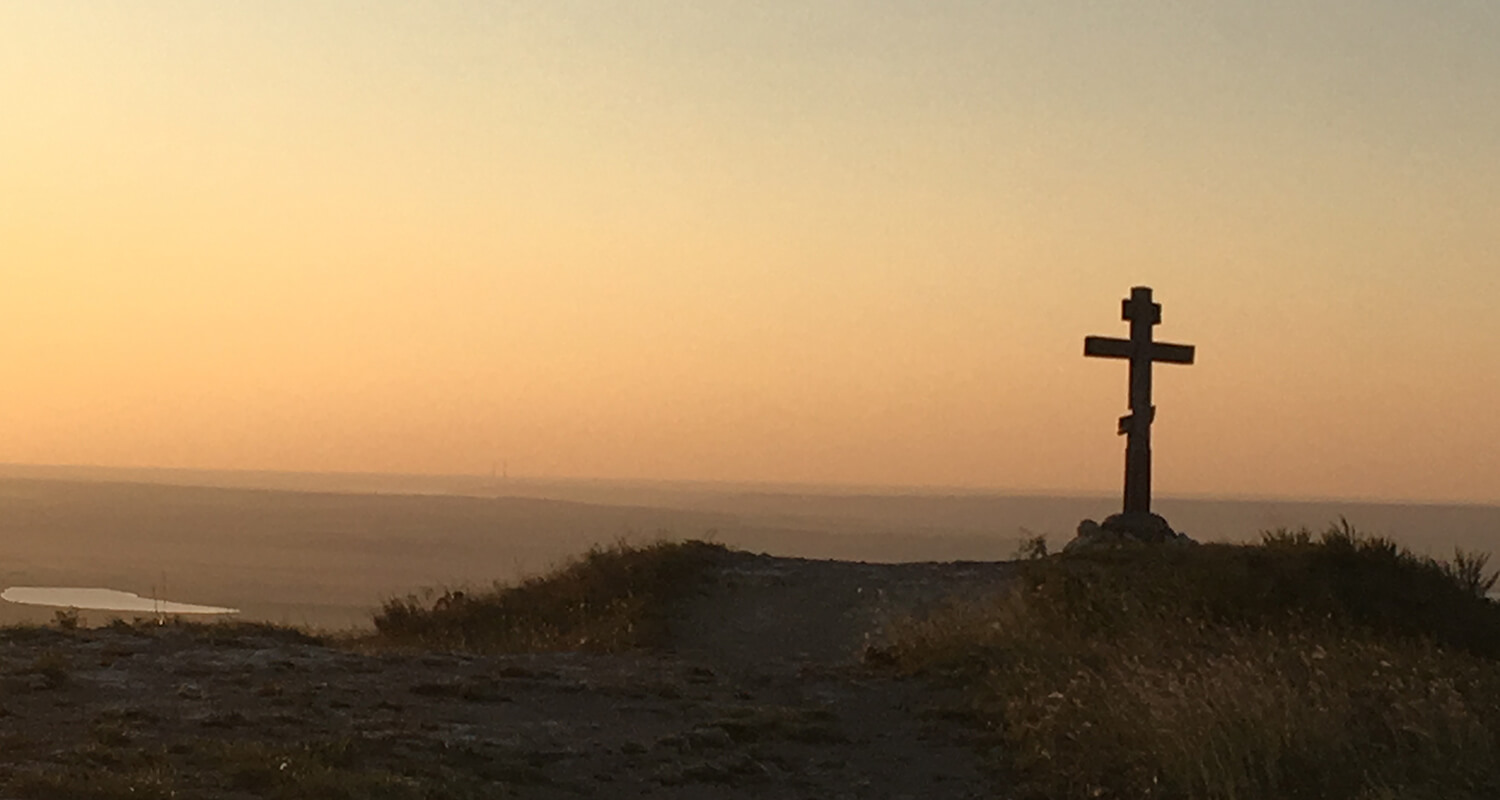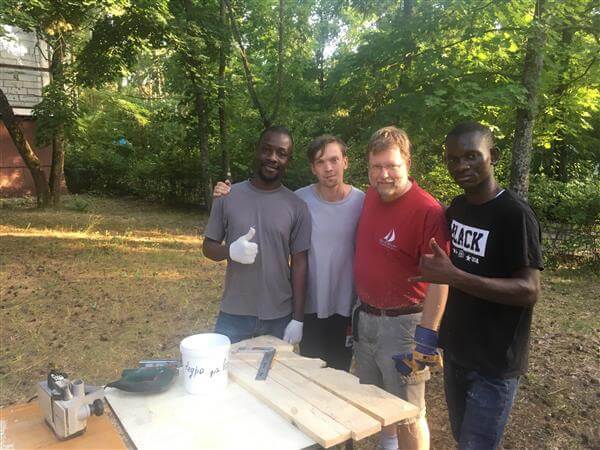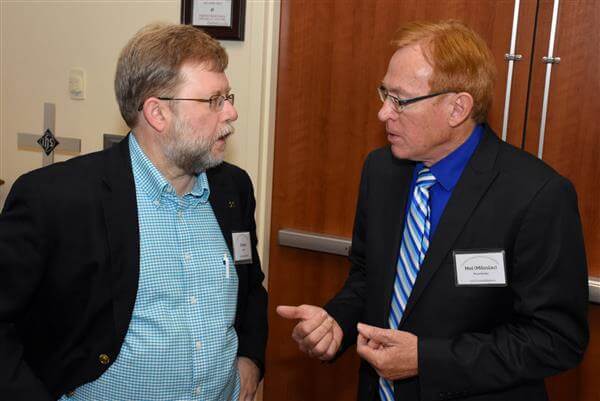
By Christie R. House
January 2020 | ATLANTA
The Revs. Irina Mitina and Charles Harrell first met in 2006, and even though they live on different continents with an ocean between them, they and the conferences they represent have maintained their connection for more than a dozen years. Their faith, their mutual participation in God’s mission in Eurasia and their connection with Global Ministries’ In Mission Together program have made their long-term relationship possible. For them, the global church can be expressed and experienced in local and even in personal ways.
The In Mission Together program is a global partnership network that equips conferences, districts or churches for transformational engagement in mission in the United States and around the world. Partners commit to one another through an agreement to participate equally as the body of Christ, using the skills and resources of each community.
Mitina serves with The United Methodist Church in Eurasia as the superintendent of the South District, formerly known as the Northern Caucasus. She pastored one of the larger congregations of the Black Soil District, Resurrection UMC in Voronezh. Currently, in addition to her role as district superintendent, she pastors the Stavropol UMC in the South District. The contexts in which she works present many challenges and obstacles to mission outreach. Since the beginning of the UMC Russia Initiative in 1995, Protestant organizations have navigated uneasy and sometimes difficult spaces alongside the majority Russian Orthodox Church.
Harrell is a retired elder of the Baltimore-Washington Conference who first participated in church-to-church partnerships with emerging Russian congregations. He has been a key leader in the conference for the coordination of work teams traveling to Eurasia. Before the formal conference relationship, Baltimore-Washington local churches were active in mission initiative projects in St. Petersburg and Moscow. At the suggestion of the Rev. Bruce Weaver, a founder of the Russia Initiative, the conference teams started working farther South.
In 2006, the conference explored the possibility of forming a conference-to-conference partnership with the Eurasian church. That was the year Harrell took the first team to assist churches in the Voronezh area to construct a retreat and training camp called Camp Kristall (or Crystal).
The next year, the Baltimore-Washington Conference and the Eurasian Episcopal Area formalized their conference-to-conference partnership. Since then, United Methodist Volunteer in Mission teams from Baltimore-Washington have returned year after year to Camp Kristall, joining Eurasian members as they finish projects at the camp and design new ones. Today, the partnership includes both the South and Black Soil districts of the Eurasian UMC.
A relationship based in mission
The Eurasia UMC uses Camp Kristall for retreats and seminars, United Methodist Women’s conferences, seasonal camps for youth and children and other church functions. Mitina says that when work teams come, they bring funds to buy tools and supplies for renovations. “The camp covers a wide territory,” she said, “so we have a lot of different tasks to be done. We have improved the buildings, erected brick structures, completed a new roof – this is all very helpful.”

But these physical activities are secondary for the Russians. “We also build relationships with each other, we become friends,” Mitina explains. “Russian people are more relationship-oriented, U.S. people, more project-oriented.”
Harrell confirmed her assessment, but, he said, “we have a good combination. Both parts are important. When people have their hearts deep in this ministry, lives are changed.” He said the main goal, besides the work, is to make good connections with the Russians and with international students at the camp.
The Eurasian church hosts youth mission conferences in which Methodist youth and young adults from across European Russia and Ukraine gather to take on a few mission projects, sometimes joining U.S. teams at Camp Kristall.
Along with the U.S. and Eurasian teams, students from many nations, especially from Africa, also volunteer. African students typically stay in Russia throughout the duration of their studies without returning home. The first year they spend gaining undergraduate competence in the Russian language. In the second year, they begin study in their academic fields.
The UMC in Russia extends a strong welcome to these students, some of whom come from Methodist congregations. United Methodist churches offer them a second home and family environment. In summertime and on other term breaks, the students come to help at the camp, where they are embraced by U.S. and Eurasian teams.
“The depth of their faith is amazing. They are smart, warm-hearted and hard-working volunteers,” said Harrell.
The miracle of changed hearts
Harrell noted that when he prepares new team members for a trip to Russia, he sometimes encounters Americans who have old ideas about those they will meet.
“When I took my first team from my congregation in Southern Maryland, I asked for their impression of Russians. They gave a cold-war stereotype. But once they spent time with the people of faith in the Eurasian UMC, they admitted they were wrong. They were welcomed by warm and gentle people who are deep in their faith.”
He gave one example of the West meets East scenario that affected everyone involved. “On one of our teams, we had a now-retired pastor who had been a fighter pilot for NATO during the Cold War. He had been trained essentially to demonize or dehumanize targets as “the enemy.” But by the end of the trip, he shared his testimony among our Eurasian hosts at the UMC in Voronezh – how he had felt and how his time in Russia had changed him.
“It so happens that a man in the Voronezh congregation who had flown MiGs (Russian Aircraft Corporation MiG, previously Mikoyan) in the Soviet air force was there that day. These two men may well have fought each other on the battlefield. But here in the church, they were together as brothers in Christ. There were hugs and tears – and an amazing witness for all to see what God can do.”
The Baltimore-Washington Conference has some volunteers who return to Voronezh every year. “It’s the depth of the relationships that keeps people coming back,” said Harrell.
Team members, whether they travel to Russian once or many times experience change in their attitudes about Russians, and they stay in touch with their Eurasian friends. People of all ages, but especially young adults, find their eyes opened to the breadth of God’s work in the world.
Presence, gifts, service and witness
For Mitina’s part, the In Mission Together program – based on a theology of mutual give and take in the mission partnership rather than one partner controlling the other – resounds with her. “Mutual ministry means we all have an important part in the mission. For us, it is important to see members of the global church with us, represented by these teams. It reminds us we are not alone.”

Like many Russian Methodists, she has experienced discrimination and criticism. Methodism is sometimes labeled a sect or cult by more traditional Orthodox communities. As a Protestant and a pastor, she has been told that she has betrayed her country. “It is sometimes very difficult to share the good news,” she admitted. “But, through this relationship with U.S. Methodists, we see support in their presence, their praise and their financial help.”
The financial help is most appreciated as the Eurasian church seeks to express its faith through mission service with other communities in need. In recent years, members of the South District have developed new ministries with the Roma people. The Roma, erroneously called “Gypsies” in many parts of the world, live at the margins of Russian society. They are a vulnerable population with no access to basic resources, such as education and health care.
“The church comes alongside the Roma,” Mitina explained. “The children lack education and most of their parents are illiterate. As a former educator, that broke my heart. It pushed me to serve Roma children.”
The South District is also engaged in a second powerful ministry initiative in North Ossetia, southeast of Stavropol. Young adults have formed teams to reach children with developmental and emotional challenges. They use drama and other art forms to help draw the children out, offer new skills and demonstrate the love of Christ.
The mutual ministry with the U.S. church provides support for these new ministries. “We can buy books for the children, and clothes, and now, create an inclusive theatre,” Mitina said. Though few in the Russian UMC have funds to contribute, they are ready to sacrifice their time and give their talents in mission. All partners play a role.
The personal relationships among team members on both sides of the partnership have grown and matured. Mitina and Harrell were born in the same year. “I call him my twin brother,” Mitina remarked. “We’ve known each other 12 years. I think this personal relationship is very important – a tangible sign of the global church. It gives us hope – hope for the future despite the global situation. This global UMC is in our prayers.”
Christie R. House is a consulting writer and editor with Global Ministries.

